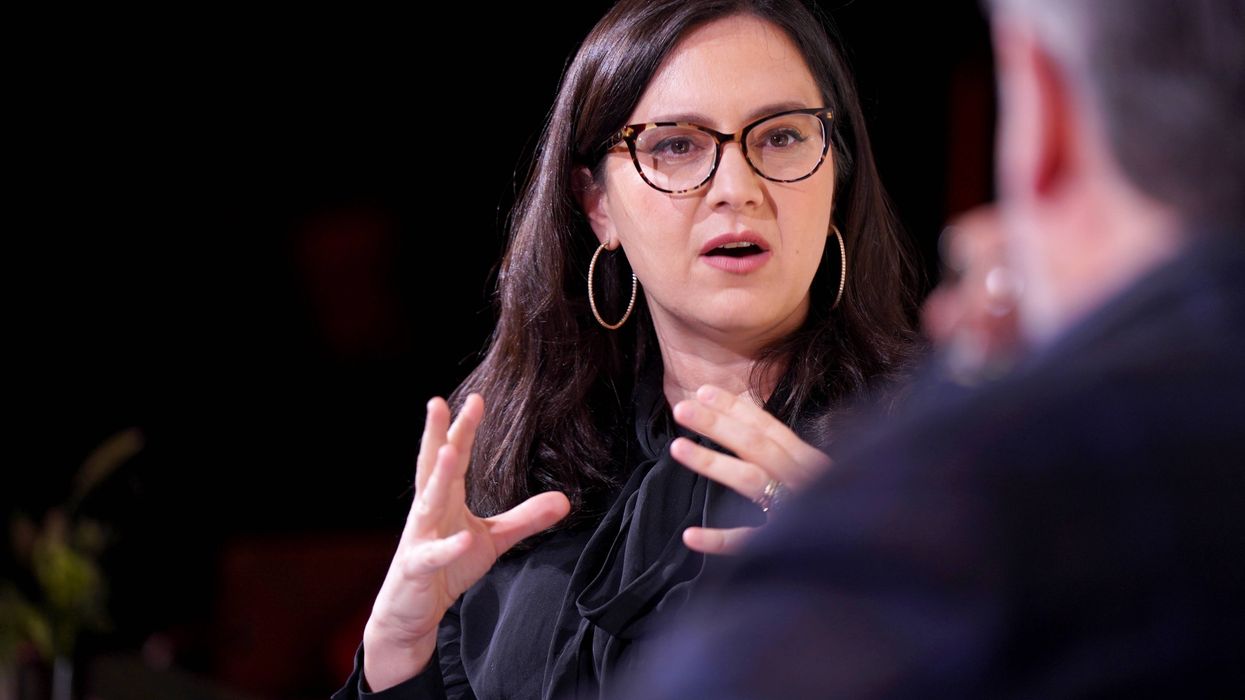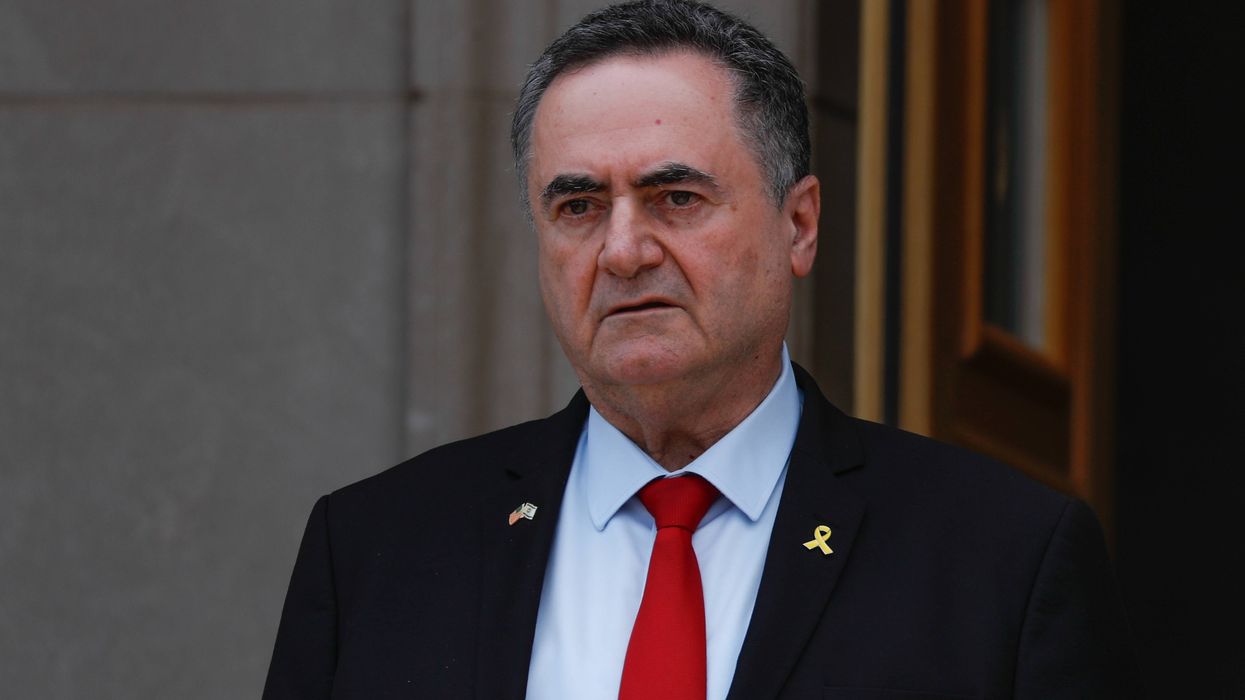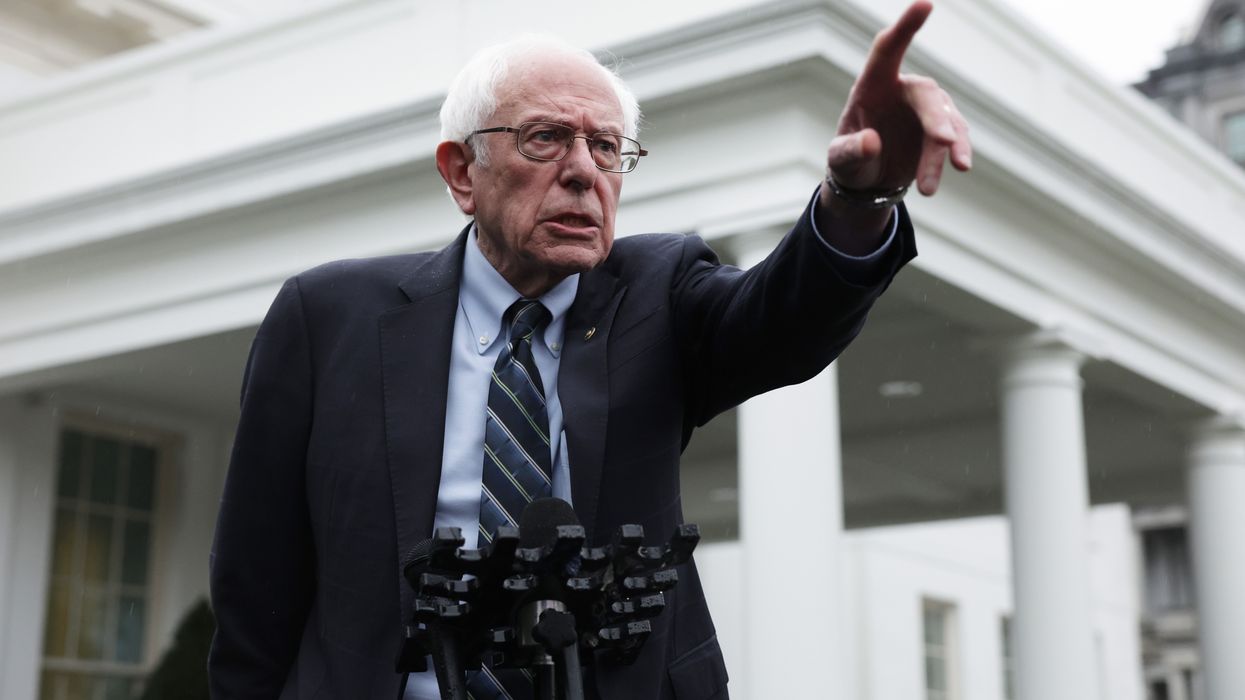February, 01 2022, 01:43pm EDT
For Immediate Release
Contact:
Ada Recinos at ada@amazonwatch.org or +1.
Alejandra Yépez Jácome at ayepez@amazonwatch.org or +593.992.713.867
Indigenous Communities Confront Ecuadorian Government and International Financiers at Oil and Energy Conference
Promises of environmental responsibility ring hollow as recent major spill turns rainforest and rivers black with crude.
WASHINGTON
Today the leaders of Ecuador's Indigenous movement and the regional pan-Amazon Indigenous organization mobilized outside Ecuador's Annual Conference for Oil and Energy (ENAEP) to demand justice for communities affected by the recent disastrous Amazon oil spill on January 28, 2022, and to denounce plans for new drilling.
"The impact of this spill has left the Amazon in a critical situation. We want territories free of resource extraction. It has caused so much damage to our territories, it is killing people. We call for climate justice," shared Nemo Andy Guiquita, a Waorani Indigenous leader, and Coordinator of Women and Health for CONFENIAE, in the action outside the event.
ENAEP is an effort by the government to attract global investment in its plans to double oil production by expanding extraction and new exploration into Indigenous territories and Amazon rainforest- including biodiversity hotspot Yasuni National Park. Yasuni is home to the Tagaeri and Taromenane Indigenous peoples living in voluntary isolation.
The event was overshadowed by the impact of last week's spill that turned the forest and rivers black with crude after the rupture of the OCP pipeline. The spill occurred inside of the Coca-Cayambe National Park and has reached the Coca River - the water source for thousands of Kichwa Indigenous peoples living along the riverbanks downstream. The government and the OCP pipeline consortium have so far refused to provide the size of the spill, only labeling it as a "major" event. No speakers acknowledged the spill during the entire event. Between 2015 and 2021, 899 spills were reported, and the country is averaging two spills a week.
"We are here, again. Behind these walls are people who think there is no life..." said Gregorio Mirabal, Executive Coordinator of the Coordinating Body of Indigenous Organizations of the Amazon Basin (COICA). "It hasn't even been 100 days since COP26, where all the presidents promised to defend the rights of nature and human rights. And yet, here they are, already negotiating our rights. Right now our rights are under negotiation and the rights of our children are at stake!"
During the conference, company representatives discussed the risks of not securing a social license to operate. The panelists advised the oil industry and government agencies to work together to provide confidence and guarantee safe investment for financiers to meet Ecuador's goals to double production. In 2020, Spanish oil company Repsol announced it would be selling its 30% stake in OCP to Canadian company New Stratus Energy. The sale was completed on January 14, 2022. JPMorgan Chase advised on the sale. JPMorgan Chase's advice to Repsol indicates the increasing consciousness in the industry about the financial and ESG risks of Amazon crude.
"In the face of an event like this one, there is a false sense of security and belief that there is no legal risk. With Executive Decree 95, the government is lying. As long as collective rights and consent are not respected, there is a liability. We tell international investors that do not respect our communities that we have in fact won and secured several legal cases against the oil industry," emphasized Leonidas Iza, Executive Coordinator of Confederation of Indigenous Nationalities of Ecuador (CONAIE). "About the oil spill - the government did not guarantee our rights. We call on the president to respect his own words and the agreements signed with environmental groups before he became president."
Since January 2021, several European banks have committed to ending their trade financing of Amazon crude, citing ESG risks. The commitments forced state-run Petroecuador to take the unprecedented move of modifying the terms of oil sales to allow buyers easier access to lines of credit. U.S. banks have not made any such commitment, despite their immense role in backing Amazon oil.
"Any investor or company jumping into Ecuador's oil expansion plans is buying a problem. The government is trying to downplay the real risks companies and banks face by backing Amazon crude extraction. Banks should adopt an Amazon Exclusion Policy to end financing and investment for any oil and gas activity in the Amazon biome," shared Kevin Koenig, Climate and Energy Director at Amazon Watch.
Communities are still reeling from a 2020 spill that sent 16,000 barrels of crude and gasoline into the river. Ecuador's rampant oil spills over the last three years are taking a devastating toll on Indigenous communities and Amazon region's fragile ecosystems and world-renowned biodiversity.
Background
During the conference, government representatives highlighted plans to double production, much of which would come from the ITT oil block inside Yasuni National Park -a UNESCO Biosphere Reserve. Road construction to connect well sites is now at the doorstep of a protected area for the Tagaeri-Taromenane, for whom drilling is an existential threat. The government also announced its intent to auction new oil blocks in the largely roadless rainforest and Indigenous territories of Ecuador's southern Amazon.
While the administration of Guillermo Lasso seeks to court investment for its ambitious plans, EU banks responsible for roughly 80% of the finance for the trade of Amazon crude from Ecuador - $10 billion over the last decade - made commitments in 2021 to end financing over concerns of contamination, deforestation, Indigenous rights violations, and the climate impacts of rainforest drilling.
Ecuador's plans face daunting legal challenges. Multiple legal cases are pending before the county's constitutional court, including one that could strike down decree 95 which paved the way for legal reforms of the hydrocarbon sector. Several cases are also pending on the right to Free, Prior, Informed consultation, and Consent of Indigenous peoples. Ecuador currently has no law on FPIC, a major ESG requirement for investors. Lack of FPIC has resulted in the departure of several companies in the past, and the recent declaration of force majeure by Andes Petroleum in two oil blocks.
Recent research by Stand.earth and Amazon Watch revealed that California is the number one destination for crude sourced from Ecuador.
Amazon Watch is a nonprofit organization founded in 1996 to protect the rainforest and advance the rights of indigenous peoples in the Amazon Basin. We partner with indigenous and environmental organizations in campaigns for human rights, corporate accountability and the preservation of the Amazon's ecological systems.
LATEST NEWS
YouTube, TikTok Deleted ‘60 Minutes’ CECOT Clips Amid Paramount Takedown Push
The segment on the notorious torture prison—where the Trump administration has been unlawfully deporting Venezuelans—went viral on social media after being inadvertently aired in Canada.
Dec 23, 2025
Websites including YouTube and TikTok this week removed posts of a CBS News "60 Minutes" segment on a notorious prison in El Salvador, where Trump the administration has been illegally deporting Venezuelan immigrants, after being notified that publishing the clip violated parent company's copyright.
The segment on the Terrorism Confinement Center (CECOT)—which was intended to air on Sunday's episode of "60 Minutes"—was pulled by right-wing CBS News editor-in-chief Bari Weiss, who claimed that the story "was not ready" for broadcast, despite thorough editing and clearance by key company officials.
“Our story was screened five times and cleared by both CBS attorneys and Standards and Practices," said "60 Minutes" correspondent Sharyn Alfonsi, who reported the segment. “It is factually correct. In my view, pulling it now, after every rigorous internal check has been met, is not an editorial decision, it is a political one.”
The segment—which can still be viewed on sites including X—was shared by social media users after a Canadian network received and broadcast an original version of the "60 Minutes" episode containing the CECOT piece prior to CBS pulling the story. The social media posts containing the segment were reportedly removed after CBS parent company Paramount Skydance filed copyright claims.
A CBS News representative said that “Paramount’s content protection team is in the process of routine take down orders for the unaired and unauthorized segment.”
Weiss—who also founded and still edits the Paramount Skydance-owned Free Press—has faced criticism for other moves, including presiding over the removal of parts of a previous "60 Minutes" interview with President Donald Trump regarding potential corruption stemming from his family’s massive cryptocurrency profits.
On Tuesday, Axios reported that Weiss is planning a broad overhaul of standards and procedures at the network, where she was hired by Paramount Skydance CEO and Trump supporter David Ellison in October, despite a lack of broadcasting experience.
Keep ReadingShow Less
Israeli Defense Minister Tries to Walk Back Vow to 'Never Leave Gaza,' Build Settlements
The remarks drew critical responses, including from other Israelis and the White House.
Dec 23, 2025
Israeli Defense Minister Israel Katz "said the silent part out loud" on Tuesday, then promptly tried to walk back his comments that his country would not only never leave the Gaza Strip, but also reestablish settlements in the decimated exclave.
Israel evacuated Jewish settlements in Gaza two decades ago, but some officials have pushed for ethnically cleansing the strip of Palestinians and recolonizing it, particularly since the Hamas-led October 7, 2023 attack and the devastating Israeli assault that followed.
The Times of Israel on Tuesday translated Katz's remarks—made during an event about expanding Beit El, a Jewish settlement in the illegally occupied West Bank—from Hebrew to English:
"With God's help, when the time comes, also in northern Gaza, we will establish Nahal pioneer groups in place of the settlements that were evacuated," he said. "We'll do it in the right way, at the appropriate time."
Katz was referring to the Nahal military unit that, in part, lets youths combine pioneering activities with military service. In the past, many of the outposts established by the unit went on to evolve into full-fledged settlements.
"We are deep inside Gaza, and we will never leave Gaza—there will be no such thing," Katz said. "We are here to defend and to prevent what happened from happening again."
The so-called peace plan for Gaza that US President Donald Trump and Israeli Prime Minister Benjamin Netanyahu announced at the White House in late September notably states that "Israel will not occupy or annex Gaza," and "the Israel Defense Forces (IDF) will withdraw based on standards, milestones, and timeframes linked to demilitarization."
Gadi Eisenkot, a former IDF chief of staff who launched a new political party a few months ago, responded to Katz on social media, writing in Hebrew, "While the government votes with one hand in favor of the Trump plan, it sells myths with the other hand about isolated settlement nuclei in the strip."
"Instead of strengthening security and bringing about an enlistment law that will bolster the IDF, the government, driven by narrow political considerations, continues to scatter irresponsible and empty declarations that only harm Israel's standing in the world," he added.
The White House was also critical of Katz's comments, with an unnamed official saying that "the more Israel provokes, the less the Arab countries want to work with them."
"The United States remains fully committed to President Trump's 20-point peace plan, which was agreed to by all parties and endorsed by the international community," the official continued. "The plan envisions a phased approach to security, governance, and reconstruction in Gaza. We expect all parties to adhere to the commitments they made under the 20-point plan."
Later Tuesday, Katz's office said that "the minister of defense's remarks regarding the integration of Nahal units in the northern Gaza Strip were made solely in a security context. The government has no intention of establishing settlements in the Gaza Strip. The minister of defense emphasized the central principle of border defense in every arena: The IDF is the first and last line of defense for Israel's citizens, and the state of Israel relies for its protection solely on it and on the security forces."
Katz became defense minister in November 2024, just weeks before the International Criminal Court issued arrest warrants for his fired predecessor, Yoav Gallat, and Netanyahu over Israel's assault on and blockade of Gaza. When Katz took on the new role after serving as foreign minister, Palestine defenders accused the prime minister of swapping one "genocidal lunatic" for another.
Israel faces an ongoing genocide case at the International Court of Justice for its mass slaughter of Palestinians in Gaza. As of Tuesday, local officials put the death toll since October 2023 at 70,942, with another 171,195 Palestinians wounded, though global experts warn the true tallies are likely far higher.
At least 406 of those confirmed deaths have occurred since Israel and Hamas agreed to a ceasefire that took effect October 10. In a Monday letter demanding action from the White House, dozens of Democratic US lawmakers noted Israel's "continued bombardment against civilians, destruction of property, and insufficient delivery of humanitarian aid."
Keep ReadingShow Less
Sanders Slams Private Equity Scrooges Ending Paid Holidays for Walgreens Workers
"While the rich get richer, workers are struggling, and your decision to cut workers' paid vacation is making the problem worse."
Dec 23, 2025
Independent US Sen. Bernie Sanders on Tuesday urged the private equity firm that recently acquired Walgreens to reverse its decision to strip hourly workers at the second-largest US pharmacy chain of paid days off on Christmas and other major holidays.
After Sycamore Partners finalized its $10 billion purchase of Walgreens in late August, the pharmacy chain—now headed by CEO Mike Motz—eliminated paid holidays for New Year's Day, Memorial Day, Independence Day, Labor Day, Thanksgiving, and Christmas. Workers were notified of the move, which was first reported by Bloomberg, in October.
The move is typical of what private equity firms—sometimes called vulture capitalists—often do in order to maximize profits. In addition to slashing paid time off and benefits, they often reduce or freeze pay, fire workers, close locations, introduce aggressive sales targets, and reduce job security by replacing full-time positions with hourly or independently contracted workers. Walgreens announced last year that it planned on closing around 1,200 of its roughly 8,000 US stores, citing their struggling performance.
"This Thanksgiving, Walgreens' hourly workers faced the impossible choice between losing pay and spending the holiday with their loved ones," Sanders (Vt.)—who is the ranking member of the Senate Health, Education, Labor, and Pensions (HELP) Committee—wrote Tuesday in a letter to Sycamore Partners founder and managing director Stefan Kaluzny.
"Walgreens employs 220,000 employees, the vast majority of whom are hourly workers... Sycamore Partners' decision to cut paid holidays for these hourly workers is unfortunately not surprising," the senator continued. "The firm follows the private equity playbook of buying businesses and aggressively extracting profit while using and abusing workers."
"For example, just one year after Sycamore Partners purchased Staples, the firm extracted $1 billion from the company as it closed 100 stores and laid off 7,000 workers," Sanders noted. "That same year, Sycamore Partners drove Nine West into bankruptcy and was accused of siphoning off over $1 billion in funds."
"Meanwhile, from 2016-22, companies owned by Sycamore Partners racked up over $3 million in labor violations, including wage-and-hour and workplace safety and health violations," he added.
During the holiday season, we all want to spend time with our loved ones. And yet, just two months after buying Walgreens for $10 billion, the private equity firm Sycamore Partners stripped hourly workers of paid vacation, including Christmas and New Year’s Day. Shameful.
[image or embed]
— Senator Bernie Sanders (@sanders.senate.gov) December 23, 2025 at 9:41 AM
Sanders contrasted a reality in which "60% of Americans are living paycheck to paycheck" with the fact that "more private equity managers make over $100 million annually than investment bankers, top financial executives, and professional athletes combined."
"While the rich get richer, workers are struggling, and your decision to cut workers' paid vacation leave is making the problem worse," he stressed. "Some Walgreens workers make as little as $15 an hour. Cutting their paid leave will make it even more difficult for these workers to pay for housing, childcare, healthcare, and groceries."
"In short," Sanders concluded, "Sycamore Partners is forcing workers to sacrifice their basic needs for private equity profit."
Keep ReadingShow Less
Most Popular


